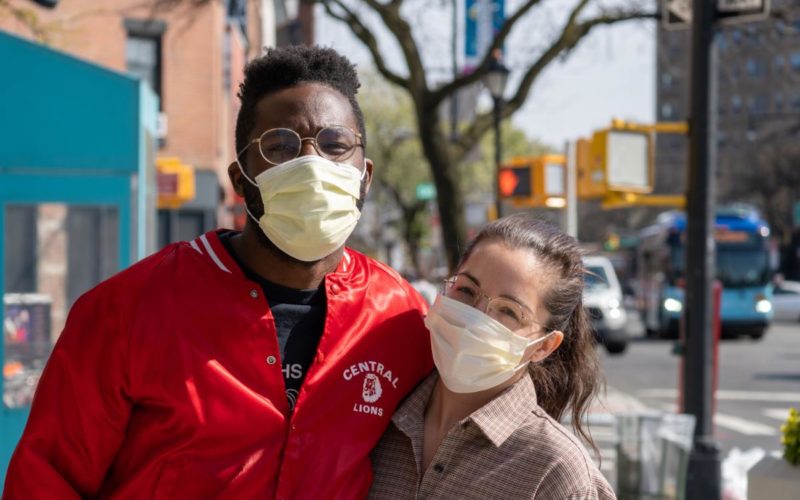To limit the spread of COVID-19, we’ve spent months physically distant from our friends. We tried to stay in contact through screens, but it’s not quite the real deal. In fact, “Zoom fatigue” proved that video conferencing doesn’t replicate the face-to-face experience of social interaction. And we need that social interaction — 63% of those sheltering-in-place reported strong feelings of loneliness.
Loneliness has been identified by many researchers as a significant public health issue. One study calls social interaction “a biological need, vital to physical wellbeing and even survival,” while another study links it to both depression and a 26% increase in premature mortality. Human beings are simply not meant to be socially isolated for long periods of time. If you haven’t been around others in months and feel a decline in mental health, there’s a lot of data that says you’ll likely get a strong boost of positivity just by going for a stroll outside with a friend.
But how do we engage with others and stay safe during an ongoing global pandemic? This is where things get much trickier. You don’t want to engage in a social activity that will get yourself sick or spread the virus to others. By staying informed, knowing your limits and respecting the boundaries of others, you can reconnect with friends without adding too much unnecessary risk.
If you noticed that your anxiety about social interactions, leaving the house, or getting the virus are resulting in maladaptive behaviours, talking to a therapist can be a good first step. You could be making things worse by continuing to isolate yourself — remember that your mental health is just as important as your physical health.
Follow the Guidelines (and Not Fake News)
The COVID-19 pandemic has spawned an “infodemic” according to the World Health Organization (WHO). This is because there’s way too much information online with little input or regulation on what is true and what is false. It can be extremely difficult to figure out what exactly we’re allowed to do and how much risk we’re taking with those activities.
It’s best to limit the over-consumption of media and stick to official health-expert updates. The Centers for Disease Control and Prevention (CDC) and WHO websites are good options. You’ll get proper instructions for wearing a mask, downloadable posters to share with others, and even advice for how to host a safe cook-out.
To ease our anxiety about social interactions, we need information that’s straight-forward and backed by research. This stops us from speculating and coming up with our own safety behaviours that may or may not be practical or effective. For example, WHO recommends not wearing a mask for exercising and reports that mosquito bites can not spread the virus.
Generally, a healthy social interaction might include organizing a meet-up with friends at an outdoor location where you can stay six feet apart. Don’t hug or shake hands, and come equipped with hand sanitizer. If you’re in close contact, especially indoors, wear a mask. Also remember that the longer you’re together, the greater the risk.
Know Your Limits, Play Within Them
Individually, we all have factors that change our experience and response to coronavirus. As you’re opening up your social circle, this is a good time to take inventory of how you’re doing. How have the past few months been for you? How has this been traumatic?
The word “traumatic” can seem extreme to some people but trauma can be loosely defined as an experience that exceeded your ability to cope or integrate the emotions into your present self. The National Institute of Mental Health found that approximately 50% of American adults will experience at least one traumatic event in their lives; however, most don’t develop post-traumatic stress disorder (PTSD). Humans are highly adaptable and will develop new coping skills to integrate these overwhelming emotions — connecting with others for social support will help with both.
However, if you’re struggling with overwhelming negative emotions, uncontrollable thoughts, changes in eating or sleeping, or an inability to connect with others, these can be signs that the trauma is having a significant impact on your mental health. Freezing your feelings (i.e. being “numb” to the world) can also be a sign that you’re emotionally overwhelmed. A therapist can help you process these feelings and help you adjust to social interactions.
Even if You Don’t Agree, Respect Other People’s Boundaries
There is a high likelihood that not all of your friends will be on the same page about coronavirus or rules for social interactions. This is okay. We are all living in our own subjective reality and the pandemic is simply highlighting this fact. You don’t know your friend’s experience and they don’t know yours — but you can still extend empathy and respect.
Before meeting up with a friend, have a direct and honest conversation about your boundaries. You should also encourage them to discuss their own. Are they okay with sitting on a patio? Do you want them to wear a mask? Are they comfortable with you using their bathroom? This isn’t about judgement, which keeps us apart, it’s about building an understanding. If you can adapt to their boundaries and they can adapt to yours, you will be rewarded with a social interaction that can help the mental health of both of you. However, if you think it will be more stressful for one or both of you, it might be best to acknowledge the difference and say that you’ll wait awhile longer before meeting up.
These are incredibly complex and difficult times to navigate. It’s important to support each other rather than create defensive conversations. Hopefully, we will each find activities and people that can safely bring us relief from loneliness. And remember, if you’re struggling with loneliness and social isolation, speaking to a professional, licensed therapist can offer a valuable form of support — and if you’d like to get started today, online therapy is an inexpensive, convenient way to do so.
Talkspace articles are written by experienced mental health-wellness contributors; they are grounded in scientific research and evidence-based practices. Articles are extensively reviewed by our team of clinical experts (therapists and psychiatrists of various specialties) to ensure content is accurate and on par with current industry standards.
Our goal at Talkspace is to provide the most up-to-date, valuable, and objective information on mental health-related topics in order to help readers make informed decisions.
Articles contain trusted third-party sources that are either directly linked to in the text or listed at the bottom to take readers directly to the source.




